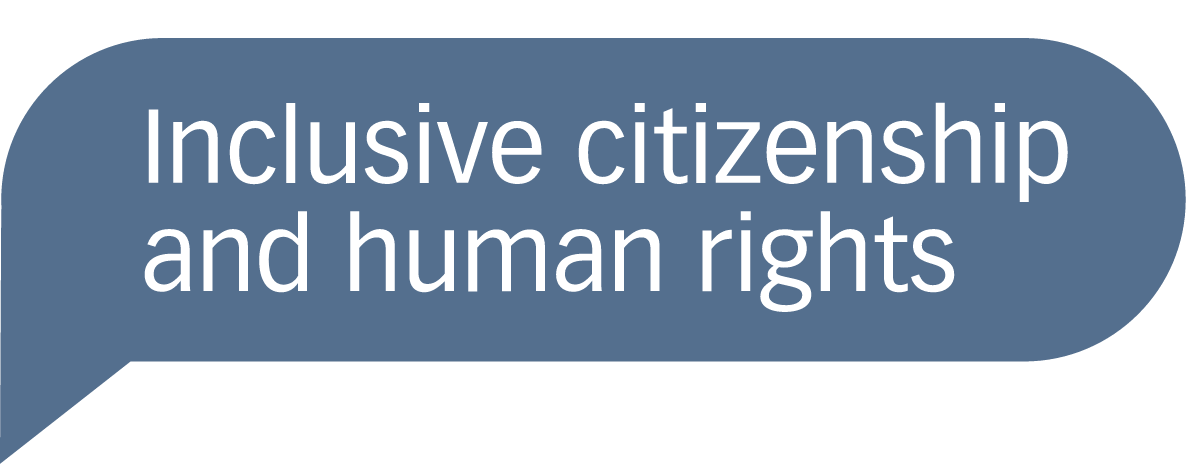
Majority of the Rohingyas are already facing statelessness, with almost 1 million taking refuge in Cox’s Bazar in Bangladesh. Half a million Bengali Muslims are in danger of statelessness in Assam due to the new citizenship registration laws and practices. The course will enable you to discuss and examine different factors that influence citizenship from a human rights perspective, related to these and other cases in different parts of the world.


The course gives insight into and enables discussion of;
- interplay between citizenship, national identity, statelessness and human rights
- dilemmas in dealing with minority/majority relations in conflict-ridden societies
- challenges minorities may face when majority religion is used to construct national identity, and when minorities have historical ties to a neighbouring country
- national and international responsibilities for people deprived of citizenship
This course is divided into four main modules, addressing the following main questions:
-
- What is the relationship between national identity and citizenship?
- What may be consequences for religious minorities when a majority religion is used to define national identity?
-
- How may exclusion from citizenship cause statelessness, and what are the challenges in particular for religious minorities with a neighbouring state connection?
- Where does the responsibility lie in such a scenario, including that of the international community?
-
- What relevance does birth registration have for the recognition of citizenship?
- How does birth registration contribute to the protection of other human rights?
-
- What are the similarities and differences in the challenges of citizenship and statelessness that the Rohingyas face compared to that of the Bengali Muslims in Assam?
- How may the underlying human rights challenges addressed by these cases be found in other countries and regions where religious identity is used as a factor in defining citizenship and national identity?
Amongst the cases analysed are: Rohingyas from Myanmar and the Bengali Muslims in Assam, India.
At the end of each module, there will be an opportunity to apply what you have perceived by way of interactive elements such as Quizzes etc., before moving to the next module. The expectation is to achieve minimum 60% correct answers in a quiz after each module to proceed to the next one. On completion of this course, you will receive a certificate.

A conflict between the majority and minority group has a serious impact on the nationality of a minority group as the majority rejects the minority identity with that of the national identity.
Dr. Sriprapha Petcharamesree a Senior Lecturer at the Institute of Human Rights and Peace Studies, Mahidol University discusses this using the case of Northern Thailand.
A short documentary that discusses migration politics in Assam, India, and why and how the new Indian Citizenship Amendment, 2019 particularly affects Assam
Dr. Sriprapha Petcharamesree a Senior Lecturer at the Institute of Human Rights and Peace Studies, Mahidol University explains using the case of Southern Thailand that when there is an ethnic and religious difference, the state expects assimilation to the majority group.
Please answer all questions starting from the top.
What are “minority rights” according to international law?
What are “minority rights” according to international law?
What are “minority rights” according to international law?
What are “minority rights” according to international law?

Fernand de Varennes, UN Special Rapporteur on Minority Issues, discusses the statelessness of minority groups using the situation of the Rohingyas as an example.
This short documentary discusses the repercussions of India’s Citizenship Amendment Act, 2019. Discussing the citizenship registration practice in Assam and the influence of the latest Citizenship Amendment Act, 2019, around 500,000 Bengali Muslims are at risk of becoming stateless

Dr. Sriprapha Petcharamesree, a Senior Lecturer at the Institute of Human Rights and Peace Studies, Mahidol University, addresses the impact of lack of birth registration on citizenship and protection of human rights using the example of an undocumented Rohingya person in Thailand.
Lack of birth registration and birth certificate have seen a serious impact on a person’s enjoyment of other rights. Fahmina, a PhD scholar at Mahidol University discusses the denial of education to Rohingya children in Cox’s Bazar refugee camp due to lack of documentations for Rohingya children.

International law recognises nationality as a right and the concept of genuine connection/ social attachment as highlighted by the International Court of Justice in 1955 has relevance in recognising one's citizenship. Such a genuine link can be established, not least with continuity of residence, the establishment of personal relationships, acquisition of property, political participation, holding public offices, etc. On passing a minimum threshold of definitive residential criteria, one should have access to citizenship irrespective of not having any formal link



